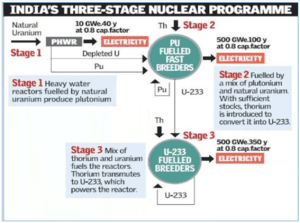TAG: GS 3: SCIENCE AND TECHNOLOGY
THE CONTEXT: On August 21, 2024, India’s second home-built 700 MW nuclear power reactor at Kakrapar Atomic Power Station (KAPS) in Gujarat, known as KAPS-4, began operating at its full capacity.
EXPLANATION:
- This milestone represents a significant achievement for India’s nuclear power sector, underscoring the capabilities of indigenous nuclear technology.
KAPS-4
- The KAPS-4 unit first achieved criticality on December 17, 2023, marking the beginning of its operational phase.
- Following this, the reactor commenced commercial operations on March 31, 2024.
- Since then, it had been gradually increasing its power output, operating at 90% capacity before reaching its full power of 700 MWe.
- The Nuclear Power Corporation of India Limited (NPCIL), which operates the plant, confirmed this development, highlighting the success of KAPS-4’s performance.
- The full-power operation of KAPS-4, along with its twin unit KAPS-3, which is already operating at full capacity, showcases the robustness of India’s indigenous 700 MW Pressurised Heavy Water Reactor (PHWR) design.
- The NPCIL emphasized that this achievement reflects the strength and reliability of India’s first-of-a-kind nuclear reactor design.
- The successful deployment and operation of these reactors are crucial milestones in India’s quest for energy self-sufficiency and sustainable development.

Regulatory Approvals and Safety Compliance
- The progression of KAPS-4 to full power was carried out in compliance with the guidelines and permissions granted by the Atomic Energy Regulatory Board (AERB).
- The AERB plays a critical role in ensuring the safety and regulatory compliance of nuclear power operations in India.
- The controlled and systematic increase in the reactor’s power level indicates stringent adherence to safety protocols, which is essential for maintaining public and environmental safety.
Future Expansion Plans
- India is not stopping with KAPS-3 and KAPS-4.
- The country has ambitious plans to expand its nuclear power capabilities.
- There are 14 more reactors of the same 700 MW design currently under construction, scheduled to commence operations progressively by 2031-32.
- This expansion plan is part of India’s strategy to meet its growing energy demands and reduce its dependence on fossil fuels.
Nuclear Capacity
- At present, NPCIL operates a fleet of 24 nuclear reactors with a total installed capacity of 8,180 MW.
- Additionally, there are eight units under construction with a combined capacity of 6,800 MW.
- In pre-project stages, there are 10 more reactors, expected to add 7,000 MW to the country’s nuclear power capacity.
- Once these projects are completed, India’s installed nuclear power capacity is projected to reach 22,480 MW by 2031-32.
Strategic Importance of Nuclear Energy in India
- The development and expansion of nuclear power in India hold significant strategic importance.
- As the country’s energy needs continue to grow, nuclear energy provides a reliable, low-carbon source of power.
- It plays a crucial role in India’s energy mix, helping to reduce greenhouse gas emissions and meet climate change commitments.
- The successful operation of KAPS-4 at full capacity demonstrates India’s commitment to leveraging advanced nuclear technology for sustainable development.




